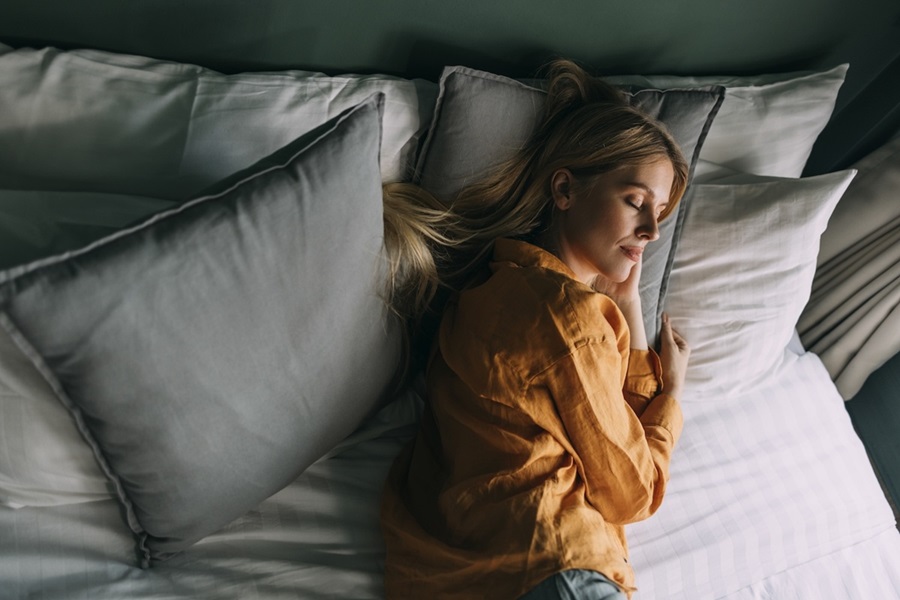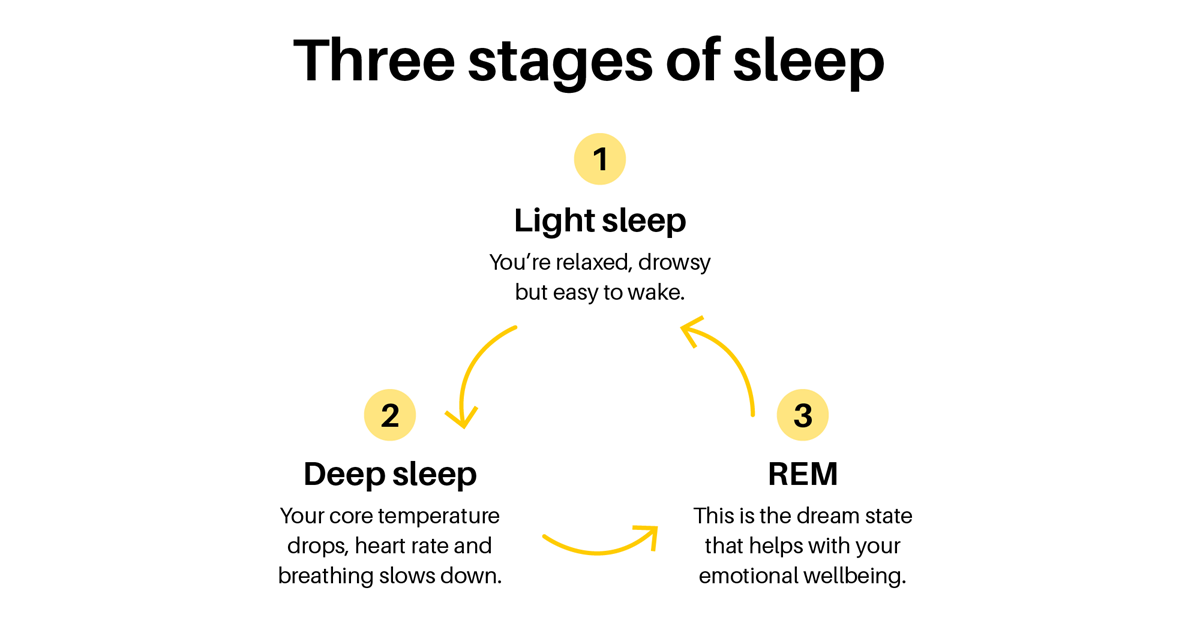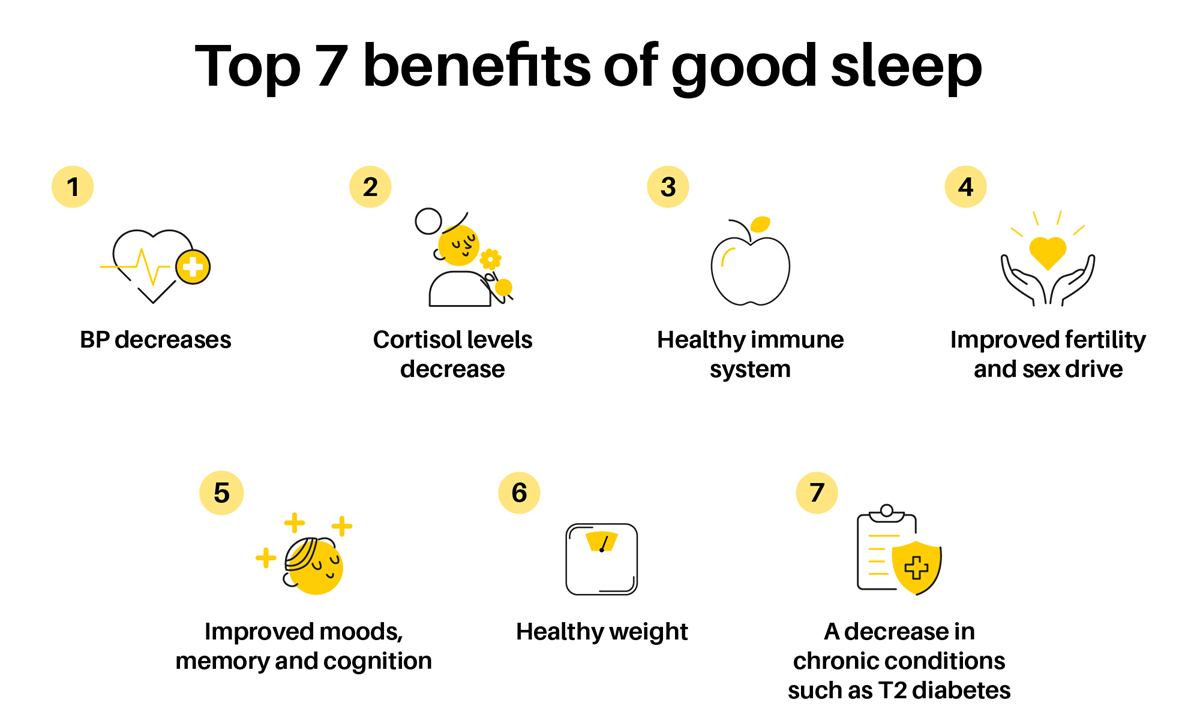- Home
- Mind & body
- The A-Zzzzzs of sleep: your guide to sleeping soundly
At CBHS we help you manage your health challenges. We believe in offering you the services, support and tools you need to live your best life.
Our Better Living Programs are available to support eligible members towards a healthier lifestyle. Each Better Living Program is subject to its own eligibility criteria.
Contact us for more information and to confirm your eligibility for a program.
The A-Zzzzzs of sleep: your guide to sleeping soundly

If you thought that sleep is something you can skip, delay or even skimp on and still look and feel your best, think again.
Sleep plays such a powerful role in our overall health and wellness but unfortunately, the pace of the modern world doesn’t recognise the benefits. In fact, according to research conducted at the Sleep Health Foundation of Australia, 40% of its sleep study participants don’t sleep well. This is generally because of issues relating to lifestyle, diet, lack of exercise and mental health.
But here’s the good news…
You can turn unhealthy sleep patterns and habits around quickly so you can wake up feeling refreshed and energised for the day ahead.
The three stages of sleep
A normal sleep cycle is made up of three stages that last for approximately 90 minutes each.
Light – makes up 2-5% of total sleep time
This is your relaxed state where you feel drowsy and ready to fall asleep, but you’re easy to wake if you nod off.
Deep – makes up 45-55% of total sleep time
Your core temperature drops during this stage. Your heart rate and breathing also slow down and your brain is ‘cleaned up’ – memories are stored in ‘files’.
REM (rapid eye movement) – makes up ¼ of total sleep time
This is your dream state. Beginning 1-1 ½ hours after you fall asleep, the REM stage plays a key role in your emotional wellbeing because of the dreaming
component. 
“Make the time to wind down 60 minutes before bed to enjoy a deep night’s sleep.”
What is sleep efficiency and why is it important?
Sleep efficiency is based on the following ratio: The total time you spend asleep compared to the total time you spend in bed. In other words, you can be in bed for eight hours at night, but only really sleep six hours – which isn’t the most restful ratio! Basically, it’s not just the quantity of sleep that’s important (approximately seven-nine hours), the quality of your sleep is just as vital.
Here’s an example:
- You believe you’re getting around eight hours of sleep each night
- Bedtime is 10pm / wake time is 6am
- It takes you about one hour to fall asleep
- You wake up twice to use the bathroom
- And it takes you roughly 30 minutes to fall back asleep.
The result? You’re only getting six solid hours sleep a night. Essentially, broken sleep doesn’t equate to a good night’s rest.
According to Sleep Scientist, Matthew Walker (yes, it’s a thing!), if you’re healthy and not sleep deprived, you’ll have a sleep efficiency ratio of 85-95%. By the way, 100% sleep efficiency is abnormal – so don’t be so hard on yourself if you’re not getting full marks!
Winding down, not up, is essential for a good night’s sleep
Making enough time to unwind and really relax before bedtime is key if you want to give yourself the best chance of falling into a good, regenerative sleep.
For example: if you’re typically awake by 6am each morning and you need eight hours of sleep to function effectively, you need to be asleep by 10pm at the latest. This means you may need 30-60 minutes of wind down time to make sure you’re asleep by 10pm.
“It’s not just about the quantity of your sleep – your quality of sleep is just as important.”
Sleeping on the job
As part of his sleep studies, Matthew Walker also identified four top truths on how a lack of sleep can affect your ability to survive – and thrive – at work.
Sleep-deprived employees:
- Take on less challenging tasks
- Generate very few creative solutions
- Aren’t efficient at collaborating with colleagues
- More likely to deceive, cheat, engage in inappropriate behaviour.
How do you feel after a bad night’s sleep?
The truth is, all the sleep statistics and studies in the world are no match for lived experience. So, when you wake up in the morning, groggy and unsatisfied with your sleep, how do you feel?
We’ve all done it. Stayed up a little too late bingeing that must-watch series, extended your romantic dinner past midnight on a ‘school night’, crammed for a test into the small hours.
Late nights are a part of modern life, but they should be the exception and never the rule. Here’s how a lack of good quality sleep can affect you:
- Brain fog
- Lack of concentration
- Irritability
- Mood swings (stress and anxiety)
- Flawed decision making
- Poor memory and recall
- Lack of energy.
“Healthy sleep patterns can help you think clearer, enjoy more vitality and brighter moods.”
How to spot the signs of poor sleep quality
You may think you’re doing all the right things to help you drift off to sleep each night. However, if you’re still waking up feeling tired and lethargic in the morning, even when you think you’ve had enough sleep, this could be a sign of poor sleep quality. Many things could be contributing to this.
- Poor sleep hygiene habits
- Stress
- Sleep apnoea
- A chronic health condition
- A sleep disorder.
Signs of poor sleep quality include:
- Taking over 30 minutes to fall asleep
- Waking regularly
- Lying awake for over 20 minutes throughout the night
- Skin problems, puffy dark circles under the eyes
- You spend less than 85% of your time in bed asleep
- Lethargy and low concentration
- You need caffeine to stay awake
- You’re hungrier than usual and crave a lot of junk food
- Weight gain
- Increased stress, emotional exhaustion and mood changes.
If you’re worried about your sleep patterns, it’s a good idea to get in touch with your GP or a sleep specialist. They’ll assess you and offer advice or even a diagnosis of a sleep disorder or chronic health condition if necessary.
Why should sleep be a priority in your life?

Myth or fact: Alcohol makes you sleep better
Myth! This is probably one of the top myths associated with a good night’s sleep. Although alcohol may help you fall asleep because of its sedative properties, it also suppresses the REM stage during the first two cycles. This means that, as the night progresses, you’ll experience an imbalance between slow-wave (deep) sleep and REM sleep which will decrease the quality of your sleep. Basically, you’ll sleep less with more disruptions.

“If you’re concerned about your sleep patterns, it’s a good idea to speak with your GP or a sleep specialist for guidance.”
Count sheep or your blessings: 10 ways to a better night’s sleep
The restorative benefits of a peaceful sleep is in your hands – and bed!
- Be consistent with your bedtime – and wake times
- Relax for an hour before bed
- Clear your mind with some light meditation and deep breathing
- Eat healthy meals during the day – snack less
- Keep devices, TVs, laptops out of the bedroom
- Get out in the sun during the day
- Exercise: it could be an intense workout or just gentle stretching
- Avoid napping after 2pm
- Drink your final caffeinated beverage at 12pm
- Scent your pillow with a few drops of calming, lavender oil

Sleep on it – for your good health
Second nature to babies, challenging for toddlers, a nuisance for teens, a luxury for adults and sometimes elusive for the elderly, sleep is a force we ignore at our peril.
While it’s true that modern society rewards ‘busy-ness’ and go-go-go lifestyles – sleep should never be viewed as a ‘nice-to-have’ when you get the time and space. A good night’s sleep is one of nature’s most effective and powerful ways to stay happy and healthy well into old age. It can help keep your brain alert, skin healthy, regulate your moods and fill you with energy all day long.
For more tips on sleeping well – every night – be sure to check out our sleep and fatigue section.
Until then, press that snooze button… your body and brain will thank you. Sweet dreams.
All information contained in this article is intended for general information purposes only. The information provided should not be relied upon as medical advice and does not supersede or replace a consultation with a suitably qualified healthcare professional.
Sources:
https://www.cbhs.com.au/mind-and-body/blog/how-to-slow-down-and-top-up-your-health-and-wellbeing
https://www.cbhs.com.au/mind-and-body/blog/embracing-the-natural-flow-of-life-with-meditation
Sleep Quality: How to Determine if You’re Getting Poor Sleep | Sleep Foundation
Sleep efficiency calculator | Fast Asleep (fast-asleep.com)
https://www.sleephealthfoundation.org.au/component/tags/tag/general-sleep-tips.html
Health and wellbeing
programs & support
You Belong to More with CBHS Hospital cover:
- Greater choice over your health options including who treats you
- Get care at home with Hospital Substitute Treatment program
- Free health and wellbeing programs to support your health challenges
Live your healthiest, happiest life with CBHS Extras cover:
- Benefits for proactive health checks e.g. bone density tests, eye screenings
- Keep up your care with telehealth and digital options
- Save on dental and optical with CBHS Choice Network providers
